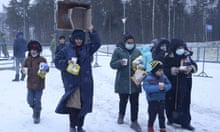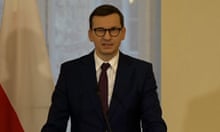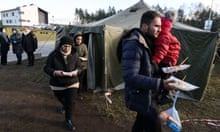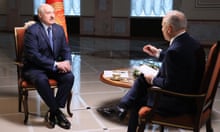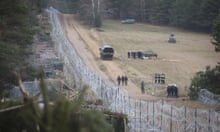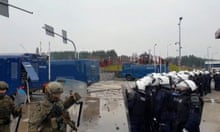Thousands have marched in Warsaw to mark Poland’s Independence Day, led by far-right groups calling for strong borders, while its troops blocked hundreds of new attempts by people to enter the country from neighbouring Belarus in a tense political standoff.
Security forces patrolled the capital and other cities for the holiday rallies, which in recent years have seen some violent attacks by nationalist extremists.
This year’s march was overshadowed by events unfolding along Poland’s border with Belarus, where thousands of riot police and troops are turning back people, many from the Middle East, who are trying to enter the European Union. Makeshift camps have sprung up in forests on the Belarusian side near a crossing at the Polish town of Kuźnica, and with temperatures falling and access to the frontier restricted, there are fears of a humanitarian crisis.
EU officials have accused the Belarusian president, Alexander Lukashenko, of using the people as pawns in a “hybrid attack” to retaliate for sanctions imposed on his authoritarian regime for a harsh internal crackdown on dissent.

“We thank the defenders of Poland’s borders,” said one banner seen in Warsaw, which is 155 miles west of Kuźnica. Traditional patriotic music, some of which was banned while Poland was part of the Soviet bloc, also played. Warsaw’s liberal mayor and courts had banned the march, but rightwing authorities in the national government overrode the order and gave the gathering the status of a state ceremony.
The government’s support for the far-right leaders of the march underlined how Poland’s rightwing ruling party wants their support. It is also engaged in a political fight with the EU over Polish changes to the country’s judiciary, viewed in Brussels as an erosion of democratic norms, along with rhetoric seen as discriminatory to LGBTQ+ groups.
In 2017, the independence march drew tens of thousands and included white nationalist and antisemitic slogans. Yet the following year, which was the centennial of Poland regaining its statehood, the president and prime minister and other leaders marched along the same route as the nationalists.
In seeking to ban the march, the mayor, Rafał Trzaskowski, an opposition figure, argued that Warsaw, which was razed by Nazi Germany during the second world war, is “no place to propagate slogans that have all the hallmarks of fascist slogans”.
TVP state television, a mouthpiece for the ruling party, called it “a great march of Polish patriots”.

As Thursday’s march began, groups carried Poland’s white-and-red national flags, but some also waved the green flags of the National Radical Camp displaying a stylised hand with a sword, a far-right symbol dating to the 1930s.
The deputy interior minister, Maciej Wasik, tweeted that many of the security forces “will go directly from Warsaw to defend our border with Belarus. When marching, remember this!”
Robert Bakiewicz, the leader of the march, said in a speech that all Poles should stand behind the troops and officials who were protecting the eastern border.
“You know, dear ones, that we meet in an exceptional situation. This march is unique, unlike any other. Today there are not only internal disputes, today there are also external disputes,” he said. “Today there is an attack on the Polish border.”



